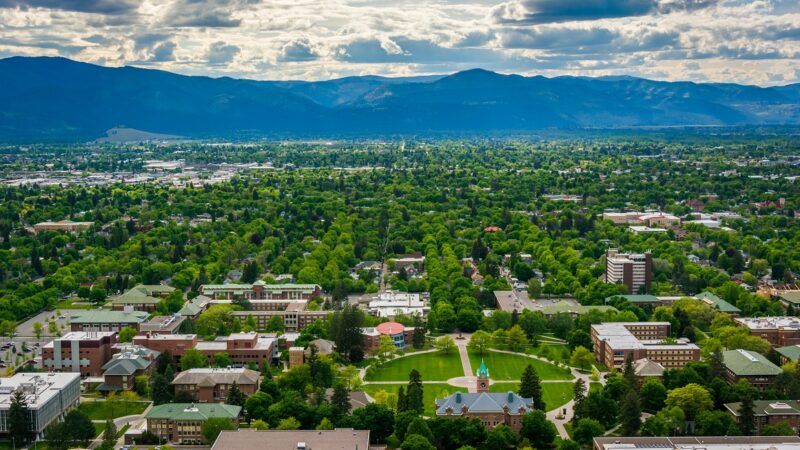Montana Becomes Latest State To Protect Free Speech With the FORUM Act
Now 14 states have legislation explicitly protecting free speech on campus.

Montana Gov. Greg Gianforte fortified First Amendment protections at public universities Thursday by signing H.B. 218. This bill designates outdoor spaces at public universities as public forums, eliminates "free speech zones" that relegate open expression to contained areas, and allows a cause of action in court to students whose First Amendment rights are violated.
State Rep. Mike Hopkins (R–Missoula) originally introduced H.B. 218 in 2018, after the University of Montana's School of Journalism refused to sponsor a speech by the conservative sociologist Mike Adams. The bill passed with broad bipartisan backing in March, with just four votes against it in the House and unanimous support in the Senate. Gianforte praised the legislation, proclaiming, "A university should be a place where the free exchange of ideas is encouraged, without voices silenced."
H.B. 218 is based on the Forming Open and Robust University Minds (FORUM) Act, a model bill developed by the American Legislative Exchange Council (ALEC) in 2017. The FORUM Act protects students and student organizations from disciplinary action for lawful expression. "Free speech is fundamental to American democracy, and FORUM represents a set of best practices for legislators to follow," says Andrew Handel, director of ALEC's Education Task Force.
The model bill affirms that the "legislature views the exercise of First Amendment rights on public university campuses in this state as critical components of the education experience for students and requires that each public university in this state ensures free, robust, and uninhibited debate and deliberation." It urges public universities to inform students of their First Amendment protections and to educate all faculty (including administrators, campus police, residential assistants, and professors) of their responsibilities in upholding a culture of open expression through school websites, handbooks, and orientation programs.
It also eliminates so-called free speech zones, a concept popularized in the 1980s and 1990s. "Having a designated free speech zone sounds like a good idea in theory," Handel says. "But they tell students that there's a specific, small area of campus that they can use at a very specific time. They've been utilized as a way to chill freedom of expression."
The legislation also requires institutions to produce annual reports on campus free speech incidents, which will then be submitted to legislators and made available to the public. "A significant amount of taxpayer dollars is appropriated to public institutions of higher education each year," the model bill reads. "As such, this legislature must ensure that all public institutions…recognize freedom of speech as a fundamental right for all."
The bill protects the rights of both speakers and students who protest speakers—and unlike other model legislation, it does not recommend particular disciplinary actions for those who obstruct speech. "If students fear their expressive activities could unnecessarily land them in a campus disciplinary hearing, they may choose to sit on the sidelines," explains ALEC's Shelby Emmett, "The FORUM Act protects speech. It does not punish speech."
Upon passage, states also waive their immunity under the Eleventh Amendment, which prevents individuals from filing lawsuits against states in federal court. This enables students whose First Amendment rights were violated to bring a cause of action in court. If their suit succeeds, they are guaranteed an award of at least $5,000.
Montana is the 14th state to adopt a version of the FORUM Act. Others to pass the legislation include Alabama, Arkansas, California, Georgia, Iowa, Louisiana, Maryland, Mississippi, Ohio, Oklahoma, South Carolina, Washington, and West Virginia. Eleven additional states have banned free speech zones on public colleges and universities.
The FORUM Act has predictably drawn opposition. Some critics have objected to a provision saying public universities cannot deny a group funding because of its "actual or anticipated expressive activity," fearing that this would protect religious organizations that discriminate against gays. "The American ideals of free speech must not be used as a sword for discrimination," the political director of the Georgia ACLU told Project Q Atlanta last year.
Others say the legislation restates the obvious. In 2019, Montana's then-Gov. Steve Bullock vetoed a similar bill, maintaining that free speech on campuses was already adequately protected by the Constitution. Handel concurs—to a point. "The Constitution is very clear that, regardless of your underlying beliefs, you have the right to speak and be heard," he says. But as long as institutions have failed to uphold this promise, he feels the FORUM Act is necessary to reaffirm speakers' First Amendment rights.
As the Supreme Court reminded us in 1957's Sweezy v. New Hampshire, "Students must always remain free to inquire, to study and to evaluate, to gain new maturity and understanding; otherwise our civilization will stagnate and die."


Show Comments (25)